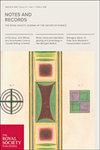Projects and pedagogical expectations: Inside P. J. Marperger's ‘golden clover leaf’ (Trifolium), 1700–1730
IF 0.6
3区 哲学
Q3 HISTORY & PHILOSOPHY OF SCIENCE
Notes and Records-The Royal Society Journal of the History of Science
Pub Date : 2018-06-20
DOI:10.1098/rsnr.2018.0005
引用次数: 0
Abstract
Many eighteenth-century projectors believed in the potential of pedagogy, including its ability to improve lives and to radically reconfigure the structure of society. Despite an obvious inability to predict how effective their projects would be if implemented, those who managed to gain the support of state leaders very frequently peddled educational reform schemes they expected would generate real improvements, including heightened abilities to apprehend the quality of usefulness. This paper considers the relationship between pedagogy and expectations in a three-part reform project put forward by an early commercial advisor and projector named Paul Jacob Marperger (1656–1730). Keenly aware of the pedagogical dimensions of ongoing efforts to both generate useful knowledge and to cultivate skilled observers and makers of it, Marperger used his project to showcase his commitment to the incremental improvement of society via the creation of new training regimens for young people and adults. The paper studies how he linked his expectations to existing institutions, technologies and ongoing reform efforts, including new teaching methods and materials.项目和教学期望:P.J.Marperger的“金三叶草”(Trifolium),1700–1730
许多18世纪的投影仪相信教育学的潜力,包括它改善生活和从根本上重新配置社会结构的能力。尽管显然无法预测他们的项目如果实施会有多有效,但那些设法获得国家领导人支持的人经常兜售他们期望的教育改革计划,这些计划会带来真正的改善,包括提高理解有用性质量的能力。本文考虑了早期商业顾问兼投影仪Paul Jacob Marperger(1656-1730)提出的一个由三部分组成的改革项目中教育学和期望之间的关系。Marperger敏锐地意识到正在进行的创造有用知识和培养熟练观察者和制造者的努力的教学层面,他利用自己的项目展示了他对通过为年轻人和成年人创造新的培训方案来逐步改善社会的承诺。这篇论文研究了他如何将自己的期望与现有的机构、技术和正在进行的改革努力联系起来,包括新的教学方法和材料。
本文章由计算机程序翻译,如有差异,请以英文原文为准。
求助全文
约1分钟内获得全文
求助全文
来源期刊
CiteScore
1.50
自引率
0.00%
发文量
45
审稿时长
>12 weeks
期刊介绍:
Notes and Records is an international journal which publishes original research in the history of science, technology and medicine.
In addition to publishing peer-reviewed research articles in all areas of the history of science, technology and medicine, Notes and Records welcomes other forms of contribution including: research notes elucidating recent archival discoveries (in the collections of the Royal Society and elsewhere); news of research projects and online and other resources of interest to historians; essay reviews, on material relating primarily to the history of the Royal Society; and recollections or autobiographical accounts written by Fellows and others recording important moments in science from the recent past.

 求助内容:
求助内容: 应助结果提醒方式:
应助结果提醒方式:


